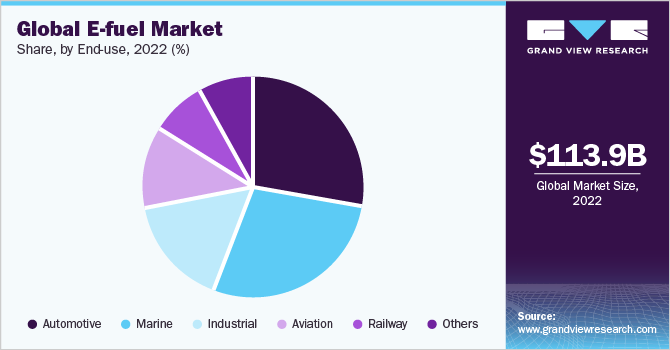E-fuel Market 2050: Exploring the Fastest Growing Segments
The global e-fuel market was valued at USD 113.94 billion in 2022 and is expected to reach USD 13,633.9 billion by 2050.
The global e-fuel market was valued at USD 113.94 billion in 2022 and is expected to reach USD 13,633.9 billion by 2050, growing at a compound annual growth rate (CAGR) of 19.0% between 2023 and 2050. This rapid expansion is driven by the increasing demand for clean and sustainable e-fuels, which help reduce global dependence on fossil fuels—key contributors to climate change and air pollution.

The COVID-19 pandemic had a mixed impact on the renewable fuel sector worldwide. The economic downturn and supply chain disruptions reduced demand for e-fuels such as e-diesel, e-kerosene, and e-methanol, especially in industries like automotive and aviation, which experienced significant slowdowns. Consequently, the global demand for e-fuels linked to these sectors temporarily declined.
The United States is among the pioneers in adopting clean energy solutions, particularly for power generation and transportation. This commitment is reflected in legislation such as the Energy Act of 2005. For example, the U.S. Department of Energy's Clean Fuels & Products Shot initiative under the Energy Earthshots program focuses on transforming the fuel and chemical industries. Its primary goal is to shift toward renewable fuels and innovative technologies, targeting an 85% reduction in greenhouse gas emissions from these sectors by 2035.
Order a free sample PDF of the E-fuel Market Intelligence Study, published by Grand View Research.
Key Market Trends & Insights
- Regional Market Share: Europe held the largest share of over 46.0% in 2022, largely due to strong governmental support such as the Renewable Energy Directive (RED II), which mandates the use of e-fuels like e-diesel and e-kerosene in transportation. Europe is expected to see substantial growth over the forecast period.
- Product Segment: Ethanol accounted for the largest revenue share of over 26.0% in 2022. This dominance is driven by global government policies and investments to increase ethanol production, including the U.S. Renewable Fuel Standard Program, which promotes renewable ethanol blending.
- State of E-Fuels: Liquid e-fuels captured over 78.0% of the market in 2022 and are expected to maintain their dominance. Their widespread use in vehicles, generators, and industrial applications, combined with compatibility with existing infrastructure, supports this growth.
- Production Method: The power-to-liquid method accounted for over 34.0% of production revenues in 2022. This method’s sustainable approach, using renewable energy to produce liquid e-fuels, addresses environmental issues related to conventional fuels.
- Technology: Hydrogen technology led the market with over 58.0% revenue share in 2022. This method is gaining traction as it produces hydrogen without carbon emissions using renewable and nuclear sources. Technologies such as polymer electrolyte membrane (PEM) and alkaline electrolyzers are key contributors.
- Carbon Source: The point source segment dominated with over 81.0% market share in 2022, thanks to its capability to capture greenhouse gases from industrial processes, effectively reducing emissions.
- Carbon Capture Type: Pre-combustion carbon capture accounted for over 68.0% share in 2022. It is widely used in gasification processes that convert carbon-containing materials into gas mixtures of hydrogen and CO2.
- End-Use Segment: The automotive sector led the market with over 28.0% revenue share in 2022. E-fuels like e-diesel and e-gasoline offer direct replacements for petroleum-based fuels in internal combustion engines, allowing automakers to adopt them without major vehicle modifications.
Market Size & Forecast
- 2022 Market Size: USD 113.94 Billion
- 2050 Projected Market Size: USD 13,633.9 Billion
- CAGR (2023-2050): 19.0%
- Europe: Largest market in 2022
- North America: Fastest growing market
Key Companies & Market Share Insights
The e-fuel market is highly competitive, featuring numerous global and regional players. Leading companies leverage collaborations, partnerships, mergers, and acquisitions to strengthen their positions. Heavy investments in research and development allow producers to innovate advanced e-fuel products, incorporating new technologies to improve energy efficiency and sustainability.
A notable example is Norsk e-fuel’s partnership with Norwegian Air Shuttle ASA announced in April 2023. Together, they plan to establish a new e-fuel production facility in Northern Norway, aimed at supplying sustainable e-fuels to the aviation industry by 2026. This collaboration is expected to boost production capacity and meet growing aviation demands for cleaner fuels.
Key Players
- Archer Daniels Midland Co.
- Ballard Power Systems, Inc.
- Ceres Power Holding Plc
- Clean Fuels Alliance America
- Climeworks AG
- E-Fuel Corporation
- eFuel Pacific Limited
- Hexagon Agility
- Neste
- Norsk e-Fuel AS
Explore Horizon Databook – The world's most expansive market intelligence platform developed by Grand View Research.
Conclusion
The global e-fuel market is poised for exponential growth through 2050, fueled by increasing efforts to reduce reliance on fossil fuels and mitigate climate change. Government policies, technological advancements, and rising consumer and industrial demand for cleaner energy sources are central to this trend. Europe currently leads the market, while North America is emerging as the fastest-growing region. Continued innovation and strategic partnerships among key players will be crucial in meeting future demand and achieving sustainability goals, particularly in sectors like automotive and aviation where e-fuels provide viable, low-carbon alternatives.